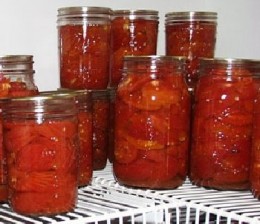Sometimes, freezing is the quickest way to preserve fresh food from the garden or farmers market. But can that frozen food be used in canning? In many cases, it depends on the food itself. Freezing will change the texture and soften the food upon thawing. This will cause the food to pack into jars differently compared to fresh food.

For example, frozen tomatoes could pack into jars differently than freshly prepared tomatoes and cause overfilling of jars since they are softer when thawed. Overfilling can result in under-processing (and therefore possible spoilage on the shelf) and possibly under-acidification with more tomatoes in the jar than expected. Process times are dependent on food being prepared as described in the preparation steps printed with the time. The best recommendation is to use these tomatoes in something that is well cooked like stewed or crushed tomatoes or make tomato juice or sauce.
The only way to consider doing this with tomatoes is to freeze the tomatoes for a very short time of just a few weeks at most, without any other added liquid or ingredients. Then when you have enough, thaw them completely and use all the tomatoes and their juices in the pack to make the crushed tomatoes with the hot pack method.
Unsweetened frozen and thawed fruit can be used in place of fresh fruit in jams and jellies. For best results, measure frozen fruit before thawing. Learn more tips about safe changes to tested canning recipes at https://www.ndsu.edu/agriculture/sites/default/files/2024-03/fn2102.pdf.
Source: Dr. Elizabeth Andress, Professor Emeritus, University of Georgia